Drevinek P, Baldwin A, Lindenburg L, Joshi LT, Marchbank A, Vosahlikova S, Dowson CG, Mahenthiralingam E. J Clin Microbiol. 2010 Jan;48(1):34–40. Epub 2009 Nov 4. IF: 3.945

Abstract:
Burkholderia cenocepacia can cause serious infections and epidemics in patients with cystic fibrosis (CF). A CF population in the Czech Republic experienced an epidemic outbreak caused by a B. cenocepacia ST-32 strain. The clonality of the isolates was evident by multilocus sequence typing; however, fingerprinting profiles obtained by pulsed-field gel electrophoresis (PFGE) showed substantial band variability. We investigated whether the PFGE pattern diversity resulted from genomic rearrangements mediated by insertion sequences (IS); in addition, we determined whether stressful growth conditions altered the transposition activity of these IS. DNA probes for IS commonly found in B. cenocepacia were designed using the B. cenocepacia J2315 genome. Southern hybridization analysis of ST-32 isolates demonstrated diversity in both the copy number and the insertion site for a homologue of ISBcen20. Movement of the ISBcen20 homologue was detected when the ST-32 isolate CZ1238 was exposed to oxidative stress (growth in the presence of H2O2). PFGE analysis of CZ1238 derivatives exposed to oxidative stress demonstrated genomic rearrangements. Interestingly, when the closely related B. cenocepacia strain J2315 was exposed to oxidative stress, no movement of ISBcen20 was detected. Since frameshift mutations are present within the transposases of all copies of this IS in J2315, our data suggest that the transposase is inactive. In summary, we have demonstrated for the first time that IS movement can be mediated by oxidative stress and can lead to genomic rearrangements in the CF pathogen B. cenocepacia. These IS movements may alter the PFGE fingerprints of isolates that are clonal by other typing methods.
-mk-
